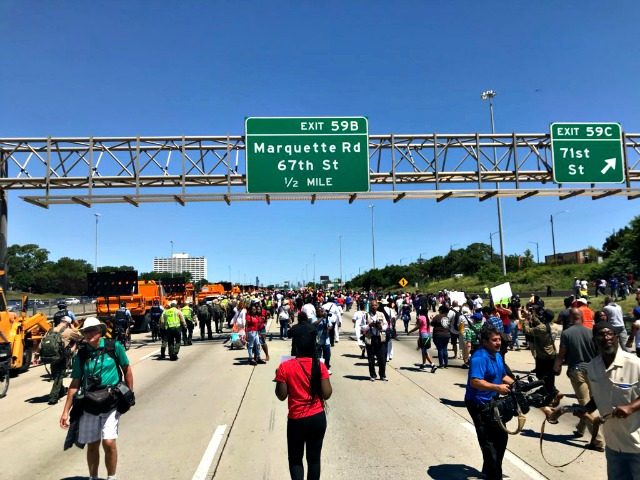Thousands of anti-gun protesters shut down lanes of a major Chicago highway to pressure lawmakers to enact gun control measures to address the increase in violent deaths in the city.
The left-wing protesters, led by the Rev. Jesse Jackson and the Catholic priest Father Michael Pfleger, shut down all northbound lanes of Chicago’s Dan Ryan Expressway on Interstate 94 Saturday morning after a standoff between the police and the demonstrators.
Breaking: all northbound lanes on Chicago’s Dan Ryan (I-94) expressway are shut down— protest lead by Jesse Jackson and Father Pfleger. #DanRyanShutDown @FoxNews pic.twitter.com/EtwZrbIEYi
— Matt Finn (@MattFinnFNC) July 7, 2018
Father @MichaelPfleger is leading a protest today, attempting to shut down one of Chicago’s major highways. Anti-violence activists are gathering now, with police readying at the 79th Street on ramp to the Dan Ryan Expressway. pic.twitter.com/Lno2ckWeC8
— Michael J. O'Loughlin (@MikeOLoughlin) July 7, 2018
The marchers carried signs that read, “We need jobs,” and chanted, “Stop the killing,” as they walked down the 1.5-mile stretch of highway to let lawmakers know their desire for better schools, more jobs, and stronger gun control laws to combat the violence in their communities.
Some children even stopped to use chalk to write the words, “Enough is enough,” along the highway route.
“When people keep ignoring you, you take it up a notch,” Pfleger said. “We are going to continue to take it up a notch until we get responses.”
The Illinois State Police reached an agreement with the demonstrators early Saturday morning that the protesters could take up two northbound lanes and allow traffic to pass through the other two lanes.
Gov. Bruce Rauner’s office said in a statement that protesters who ignored the boundaries set by highway workers would face arrest and possible prosecution.
But Pfleger and other protesters ignored the warnings, saying they would occupy the entire northbound section of the highway.
After hearing of the chaotic situation that led to the shutdown of the highway, Rauner tweeted his disappointment in Chicago Mayor Rahm Emanuel for not controlling the protesters.
I’m disappointed in the Mayor. There was an agreement in place. I am calling on the Mayor to take swift and decisive action to put an end to this kind of chaos. I will work with him in good faith and urge him to do his job so that the people of Chicago feel safe.
— Governor Rauner (@GovRauner) July 7, 2018
Emanuel quickly fired back at the Illinois governor, tweeting that he should “delete” his account for criticizing the “peaceful” protest.
It was a peaceful protest. Delete your account. https://t.co/QoKyIHmuQj
— Mayor Rahm Emanuel (@ChicagosMayor) July 7, 2018
Rauner later thanked law enforcement for their efforts to police the massive protest.
Great piece of community police work today by ISP and CPD. Despite the disruption and traffic chaos, they made sure marchers and drivers were safe. Thanks to officers from both forces.
— Governor Rauner (@GovRauner) July 7, 2018
The Dan Ryan Expressway, which encompasses parts of Interstate 94 and 90, has a history dating back to the 1960s when it was believed to be a symbol of racial segregation because of how it served as a divider between white neighborhoods and poor black neighborhoods.
Chicago had its fair share of homicides and shootings in the first six months of 2018. Chicago police said the city counted 252 homicides and 1,100 shootings during that period, mostly in low-income, predominantly black neighborhoods.

COMMENTS
Please let us know if you're having issues with commenting.